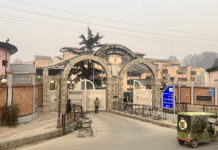SRINAGAR: As temperatures continue to rise in Kashmir, health experts have urged people, especially those exposed to direct sunlight, to take necessary precautions to avoid heat-related illnesses.
Dr Fayaz Ahmad of Government Medical College (GMC) Srinagar advised people to increase their water intake even if they do not feel thirsty. “People must try to avoid direct sunlight as much as possible and keep themselves hydrated, especially those working outdoors, such as agricultural workers and labourers,” he said.
He recommended consuming enough water multiple times a day, prioritising work during the cooler morning and evening hours, and avoiding midday activities. He also suggested eating fruits and vegetables and drinking electrolyte-rich fluids like coconut water and fruit juice.
“Excessive heat can lead to sweating, dehydration, heatstroke, and other health problems like drowsiness, irritability, muscle cramps, a drop in blood pressure, headaches, fatigue, confusion, dry and pale skin, and palpitations,” Dr Fayaz added.
Dr Sameer, another doctor from GMC Srinagar, advised people to avoid direct sunlight, especially in paddy fields, and to wear full sleeves to protect against insect bites. “Those working in the fields must drink plenty of fluids to stay hydrated,” he said.
According to doctors, hot weather can exacerbate conditions for those with heart disease and high blood pressure. They warned against excessive consumption of tea, coffee and caffeinated drinks, as these can cause fluid loss. “Eating cold foods and fruits with high water content like melon, citrus fruits, and salads is preferable. Highly-spiced food should be avoided as it increases the need for water to quench thirst,” they advised.
Clothing also plays a crucial role in managing heat, the doctors suggested. “Wear light, loosely fitted clothes in lighter colours. Darker colours, especially black, absorb more heat and transmit it to the body.”
They added, “High temperatures can lead to heat stress, causing various heat-related illnesses, ranging from mild (heat rash, heat cramps) to severe (heatstroke). Symptoms include dizziness, nausea, headache, extreme thirst, decreased urination, rapid breathing, and heartbeat. Heat stress can also worsen chronic conditions like cardiovascular, respiratory, and kidney diseases.”
For those experiencing heat stress, the doctors recommended immediate measures: “If you feel dizzy or uneasy, drink water to rehydrate, loosen clothes if possible, and move to a cooler place. Sponge with water and avoid forcing food or drink if unconscious. Seek medical attention immediately if necessary.”
In cases of severe heat stress, such as heatstroke, they advised: “Take the affected person to the nearest hospital or call an ambulance if unconscious. Do not give anything to drink or eat if the person is unconscious. If alert, provide frequent sips of cool water or fluids like an ORS solution. Remove safety gear, loosen clothing, splash or sponge with tap water, and turn the person onto their side if vomiting to avoid choking.”—(KNO)















